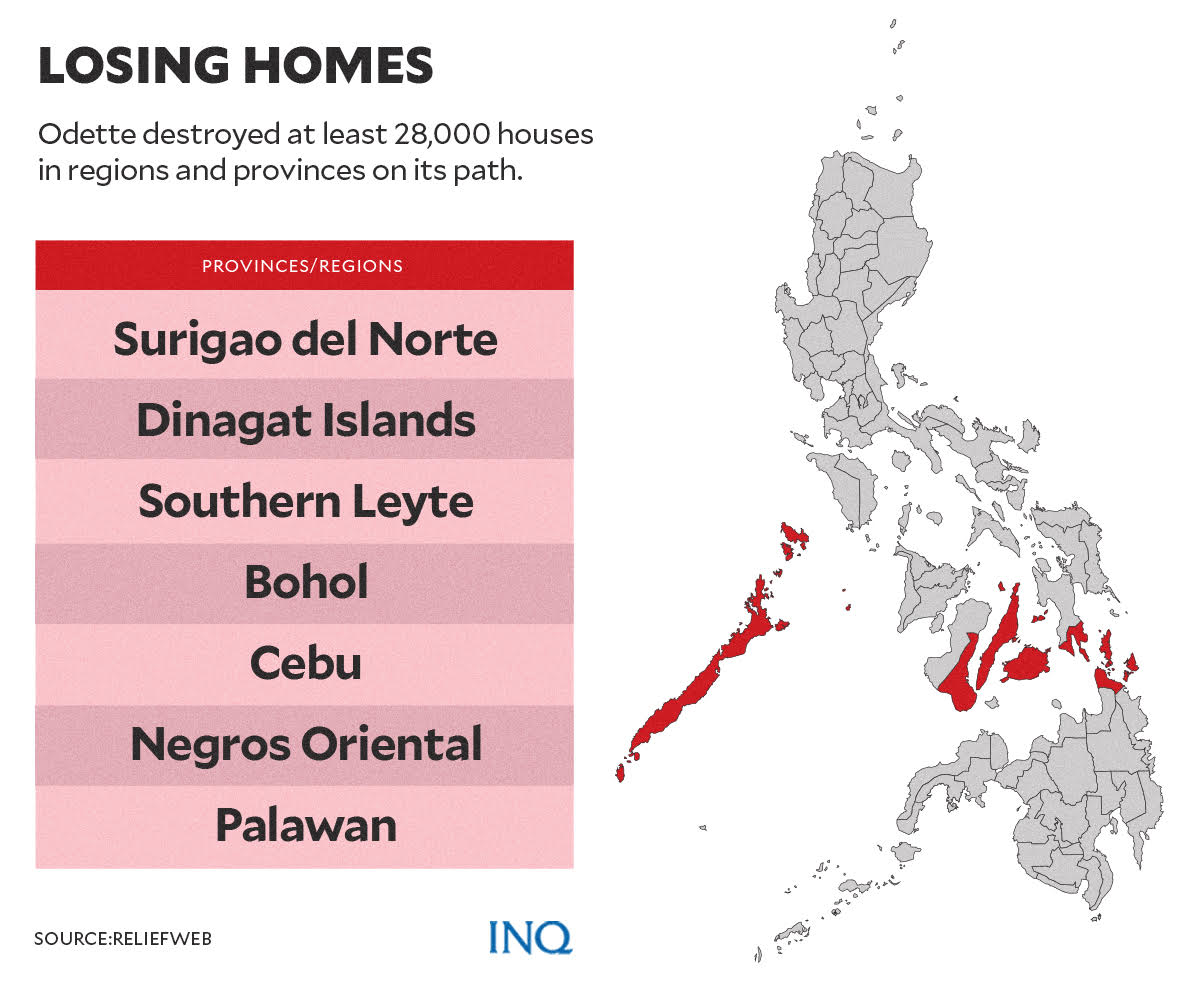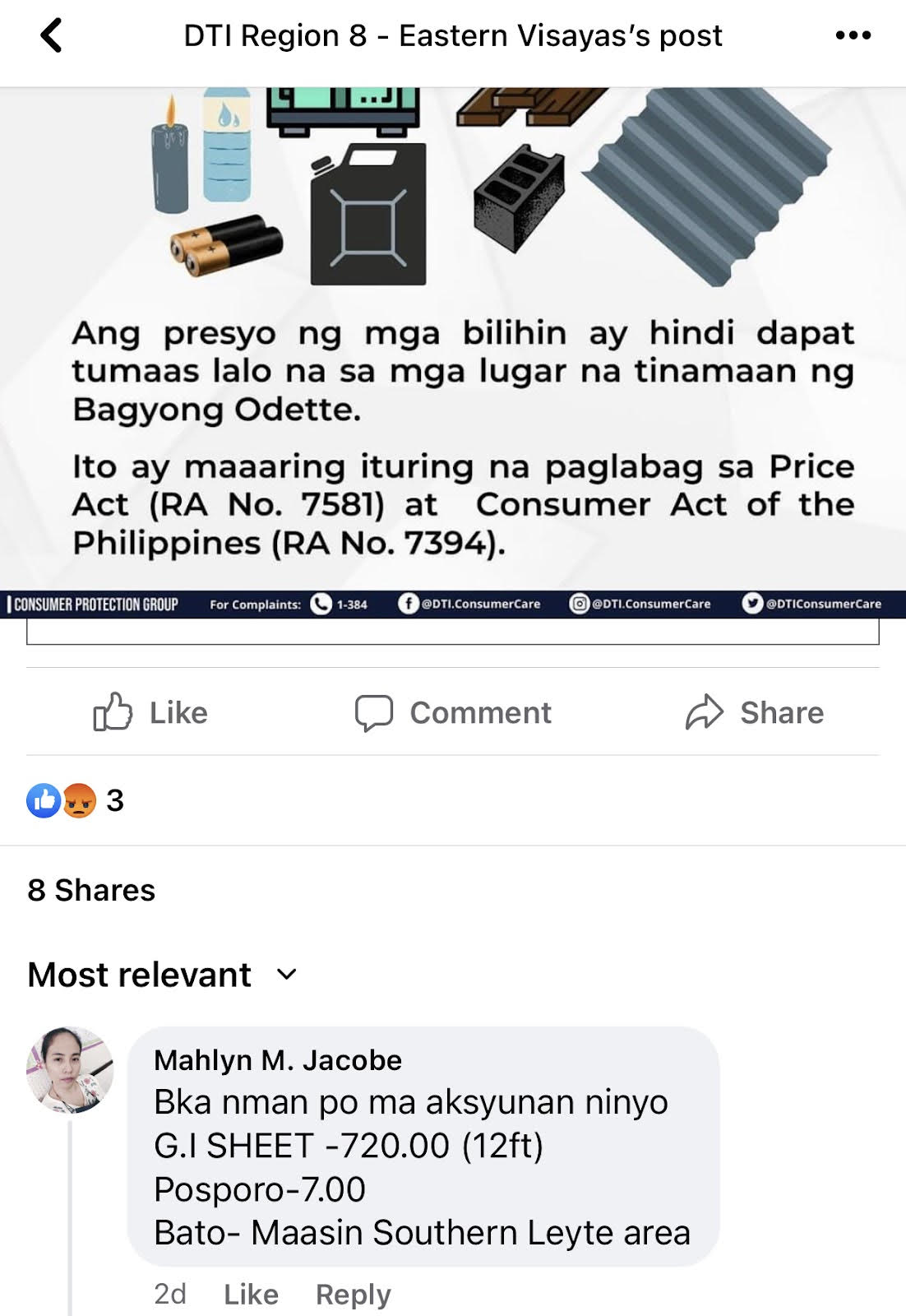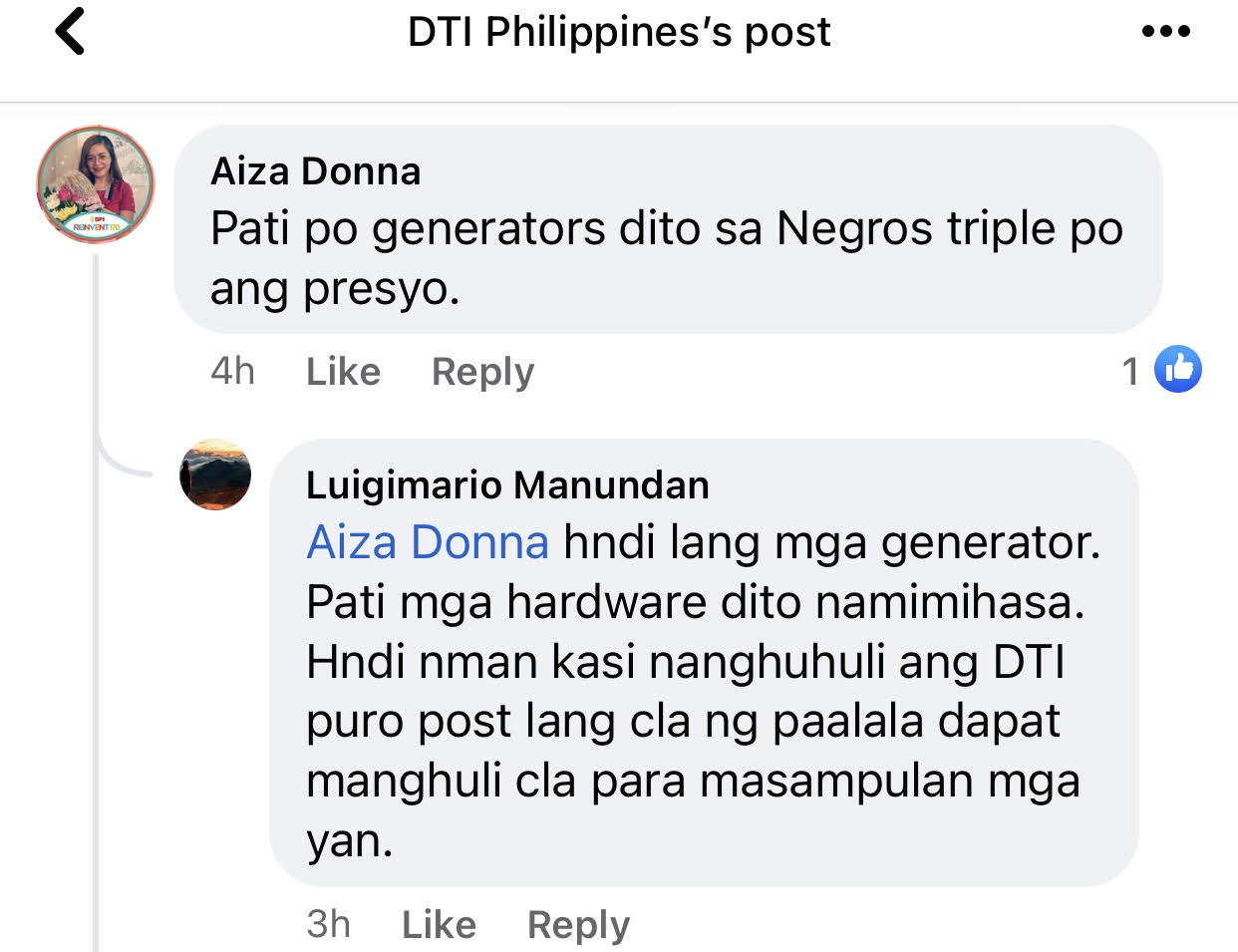Construction material profiteers kick Odette survivors in the face
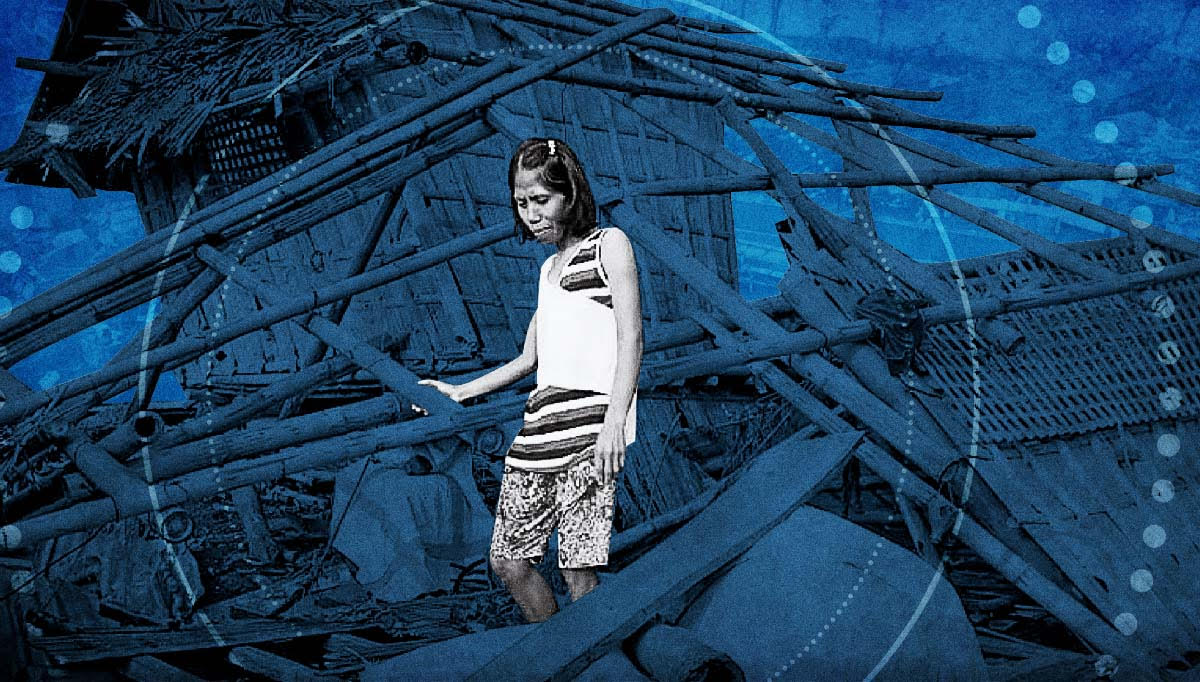
FILE PHOTO
MANILA, Philippines—While Super Typhoon Odette (Rai) left thousands of Filipinos homeless this Christmas, individuals who are starting repairs on their own are being stabbed by a sudden spike in costs of construction materials.
Complaints are now flooding social media from netizens in the Visayas and Mindanao who are trying to rise on their feet by fixing houses damaged by Category 5 winds when Odette made landfall nine times in the two islands, the worst to hit the Philippines in 2021.
READ: PH’s typhoon alley and the trail of destruction it brings
ReliefWeb, the information service of the United Nations Office for the Coordination of Humanitarian Affairs, said the typhoon has affected over 1.8 million people—600,000 were displaced as over 28,000 homes were destroyed in Surigao del Norte, Dinagat Islands, Southern Leyte, Bohol, Cebu, Negros Oriental and Palawan.
READ: Odette: Impact on PH described as ‘catastrophic’
However, reminiscent of what happened when Super Typhoon Yolanda (Haiyan) hit the Philippines in 2013, the cost of construction materials, which are desperately needed by the thousands of people whose homes were destroyed by Odette last week, needlessly skyrocketed.
This was revealed as the Department of Trade and Industry (DTI), in its enforcement of Republic Act No. 7581 or the Price Act, declared a 60-day price freeze on all basic necessities in Southwestern Tagalog Region, Western Visayas, Central Visayas, Eastern Visayas, Northern Mindanao, and Caraga Region in the aftermath of Odette.
Signed on May 27, 1992, Republic Act No. 7581 protects consumers by “stabilizing the prices of basic necessities and prime commodities and by prescribing measures against undue price increases during emergency situations and like occasions.”
It said that it is the policy of the government to make certain the availability of basic necessities and prime commodities at reasonable prices at all times without denying legitimate businesses a fair return of investment. It also provides effective protection to consumers against illegal price spikes.
The Central Visayas office of the DTI said construction materials like cement, galvanized iron (GI) sheets, hollow blocks, construction nails, batteries, electrical wires, light bulbs, and steel wires are part of the necessities being monitored by the DTI, saying that “retailers should not take advantage of the crisis.”
But many dealers and traders in the areas worst hit by Odette are defying or ignoring the law, according to complaints aired through social media.
The posts made by the DTI and its regional offices were met with complaints from individuals hit by the typhoon, who said that the cost of construction materials already skyrocketed and dealers are taking advantage of the devastation.
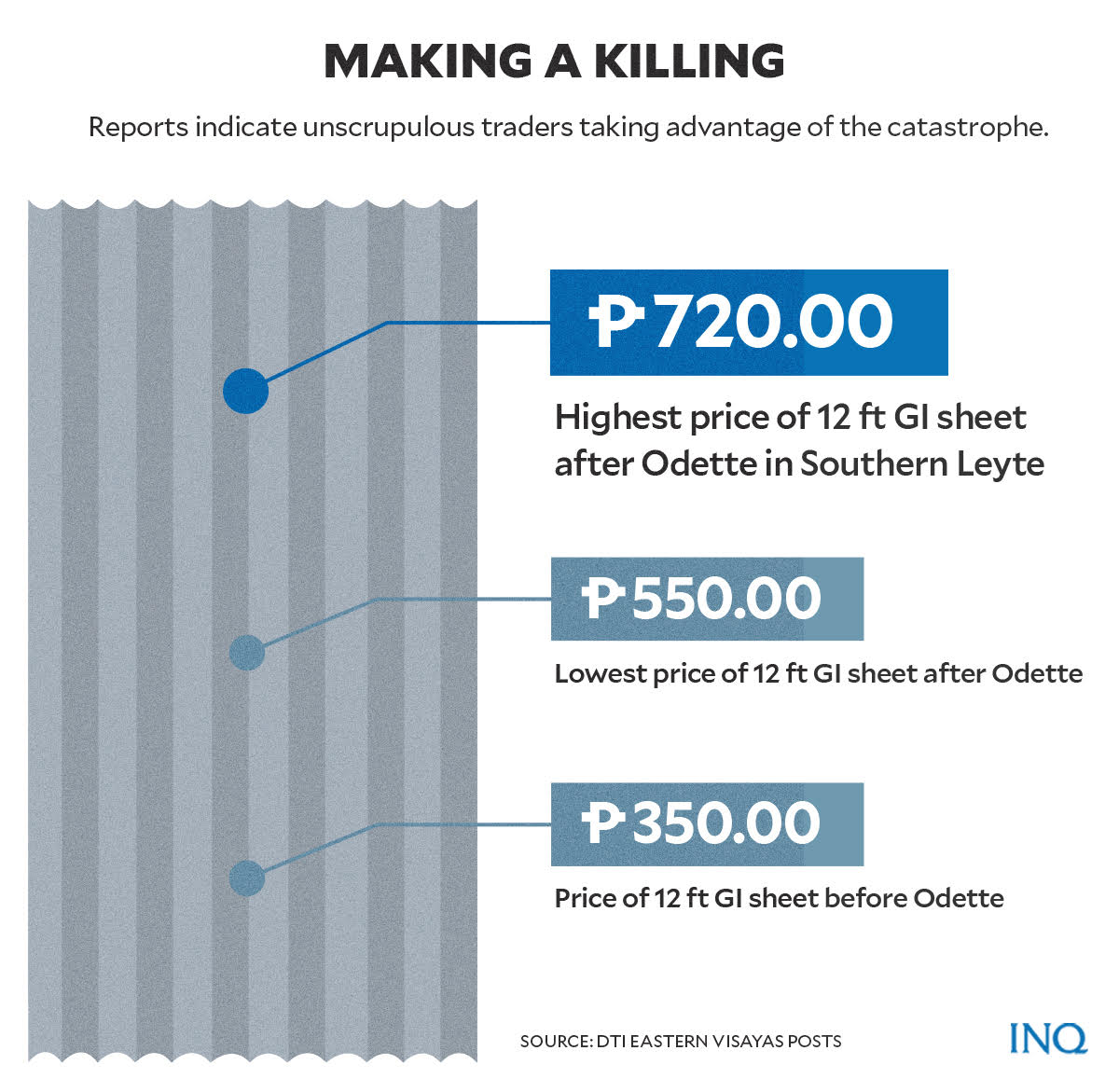
Graphic by Ed Lustan
In one instance, netizen Mahlyn Jacobe commented on DTI Easten Visayas’ post, asking the office to act on the needless rise in prices. She said that in Maasin, Southern Leyte, a 12 ft. GI sheet already costs P720 each. Thess Malinao, another netizen, backed what Jacobe said, saying that a GI sheet now costs over P550, higher than the P350 before Odette hit.
Netizen MJ Dela Torre commented on DTI Mimaropa’s post, expressing concern over the instant increase in the cost of construction materials. “Instead of helping, they are bringing down people,” he said while asking the DTI if it can really prevent overpricing.
Palawan News said that in Roxas town and Puerto Princesa City, concerns were raised over the increase in the cost of roofing materials, like metal sheets, which were being sold for P1,000 each, higher than the P500 these cost each before Odette devastated the Visayas and Mindanao last week.

Graphic by Ed Lustan
It said DTI official Persival Narbonita asked retailers of construction materials not to take advantage of the crisis as it would be tough for individuals hit by the typhoon to recover knowing they already lack resources. He said retailers should comply with Republic Act No. 7581.
Netizen Luigimario Manundan said in a comment on DTI’s post that hardware stores are already taking advantage of the devastation that the typhoon left. He explained that it is not enough for the DTI to remind retailers about the law. “They should fine the violators,” he said.

Graphic by Ed Lustan
What the law says?
Section 6 of Republic Act No. 7581 states that “unless otherwise declared by the President, prices of basic necessities in an area shall automatically be frozen at their prevailing prices or placed in an automatic price control whenever:”
Conditions that would require a price freeze included:
- The area is proclaimed or declared a disaster area or to be in a state of calamity
- The area is under an emergency
- The privilege of writ of habeas corpus is suspended in that area
- The area is declared to be in a state rebellion
- A state of war is declared
Last Dec. 23, President Rodrigo Duterte, through Proclamation No. 1267, declared a state of calamity in Southwestern Tagalog Region, Western Visayas, Central Visayas, Eastern Visayas, Northern Mindanao, and Caraga Region, saying that the regions were “adversely affected” by the typhoon.
The law said basic necessities included rice, corn, bread, fresh, dried and canned fish and other marine products, fresh pork, beef and poultry meat, fresh eggs, fresh and processed milk, fresh vegetables, root crops, coffee, sugar, cooking oil, salt, laundry soap, detergent, firewood, charcoal, candles, and drugs classified as essential by the Department of Health (DOH).
“Prime commodities,” it said, are fresh fruits; flour; dried processed and canned pork; beef and poultry meat; dairy products not falling under basic necessities; noodles; onions; garlic; vinegar; patis; soy sauce; toilet soap; fertilizer; pesticides; herbicides; poultry; swine and cattle feeds; veterinary products for poultry, swine and cattle.
Paper; school supplies; nipa shingles; sawali; cement; clinker; GI sheets; hollow blocks; plywood; plyboard; construction nails; batteries; electrical supplies; light bulbs; steel wire; and all drugs not classified as essential by the DOH are also considered as prime commodities.
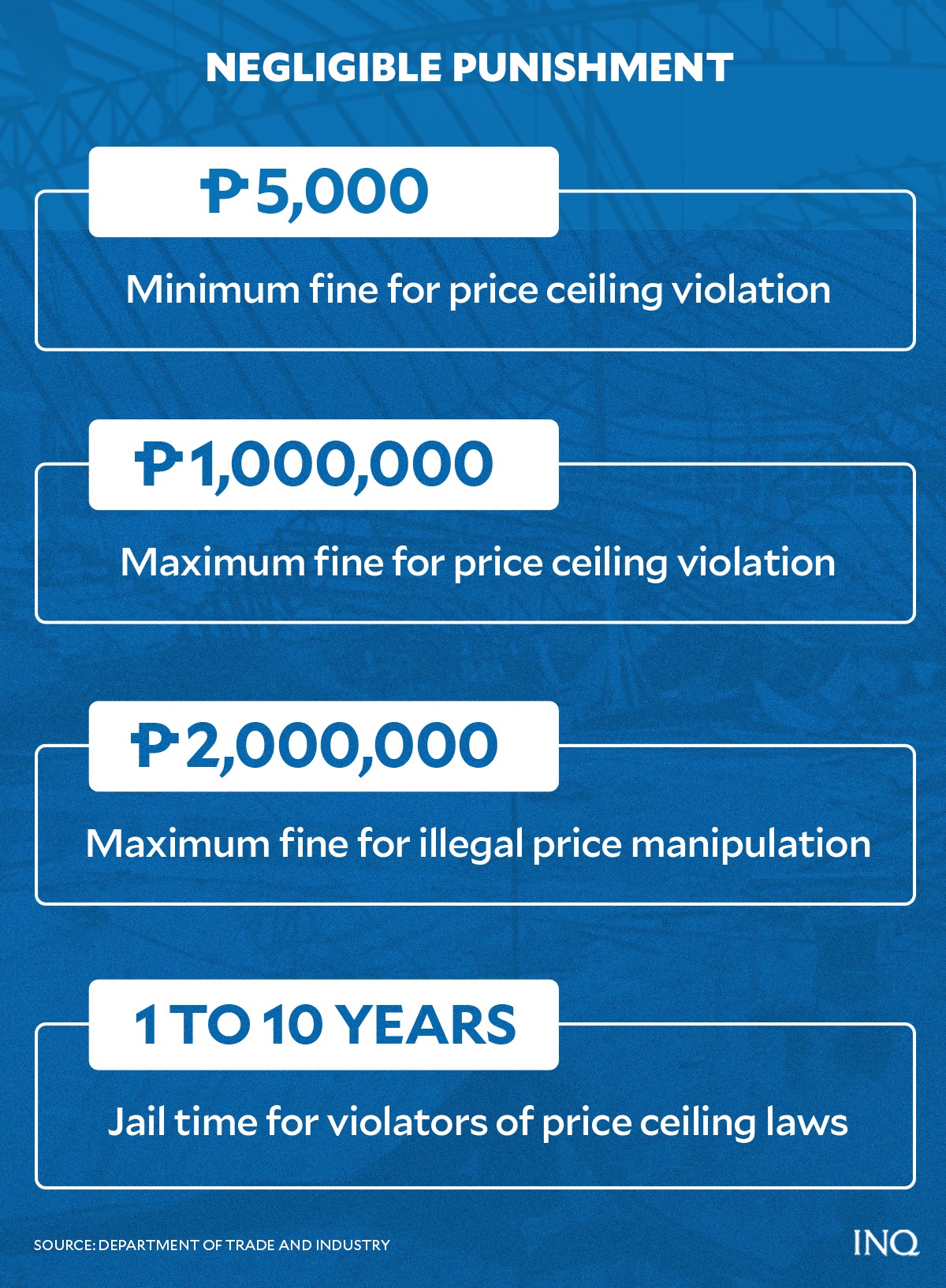
Graphic by Ed Lustan
Those who violate price ceilings will be penalized with one to 10 years of imprisonment and a fine of P5,000 to P1,000,000 while those who commit illegal price manipulation will be penalized with an imprisonment of five to 15 years and a fine of P5,000 to P2,000,000.
